In this week’s review of Court Judgments, we look at Kerala High Court upholding the grant of maintenance to wife who voluntarily left husband even though the charges of cruelty were unproven, MP High court’s restraint order regarding a demolition at short notice, Madras High Court’s judgment to recover loss to exchequer due to negligence from public servants, Bombay High Court’s observation regarding allegation of rape and J&K&L High court’s reiteration regarding challenging constitution of enquiry committee after taking part in enquiry.
Kerala HC: Upholds Grant of maintenance to wife who voluntarily left husband, although the charge of cruelty is unproven.
A single-judge bench of Kerala High Court, consisting of Justice A. Badharudeen, upheld the grant of maintenance to a wife, who voluntarily left her husband, although she failed to prove a cruelty charge against him.
The court was dealing with the case, Arun vs. Reshma. Earlier, the Family Court directed a man to pay Rs. 4 thousand maintenance to his wife. He filed a revision petition in the High court and argued that she has left him voluntarily and without any justified reasons and hence, he has no liability to pay maintenance to his wife.
The counsel on behalf of the husband further stated that the case filed by the respondent i.e., the wife on the ground of cruelty ended in acquittal.
However, the court observed that there could be other circumstances which would not count as cruelty but deny the wife of living a peaceful life in a matrimonial home. These circumstances are a reasonable grounds to deny ‘joint residence’.
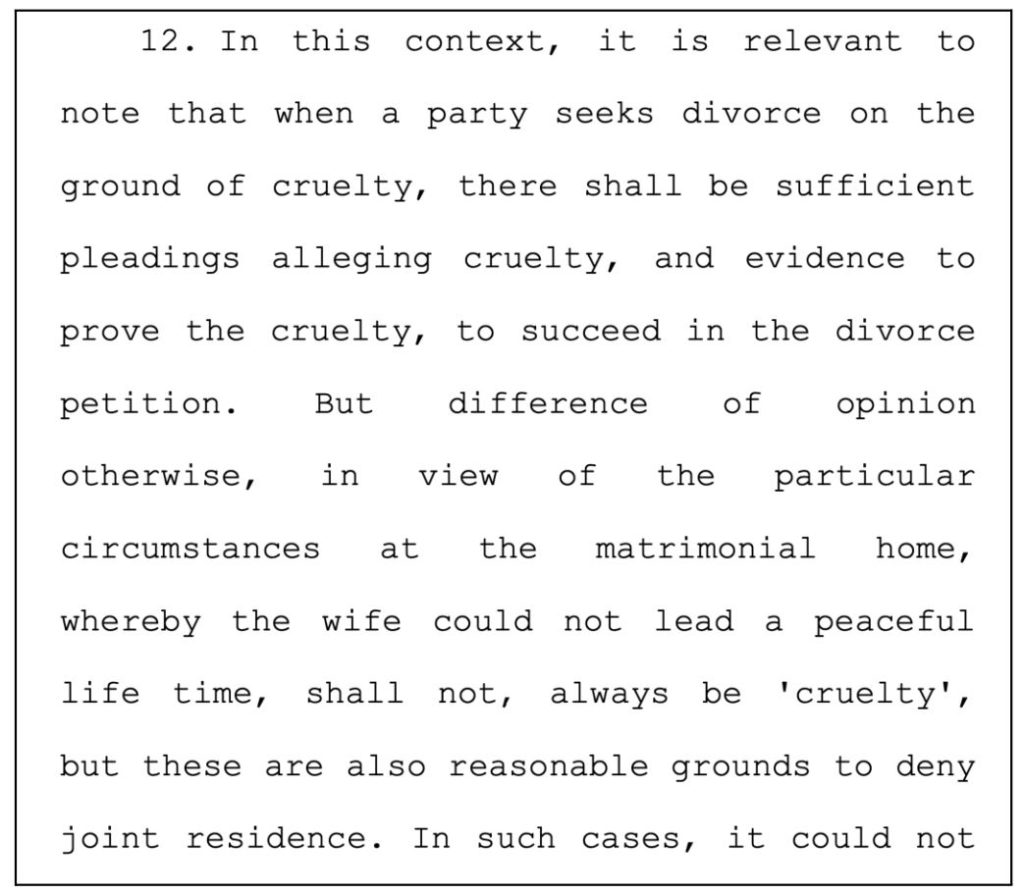
Justice A. Badharudeen observed that the wife leaving the house voluntarily under such circumstances does not support the argument of the husband that he is not legally entitled to provide maintenance.
The court further considered the fact that the wife remarried in September 2022 and hence, the entitlement to maintenance ceased from the date of marriage. However, it directed the petitioner to clear the dues, which it reduced to Rs. 3,500 per month.
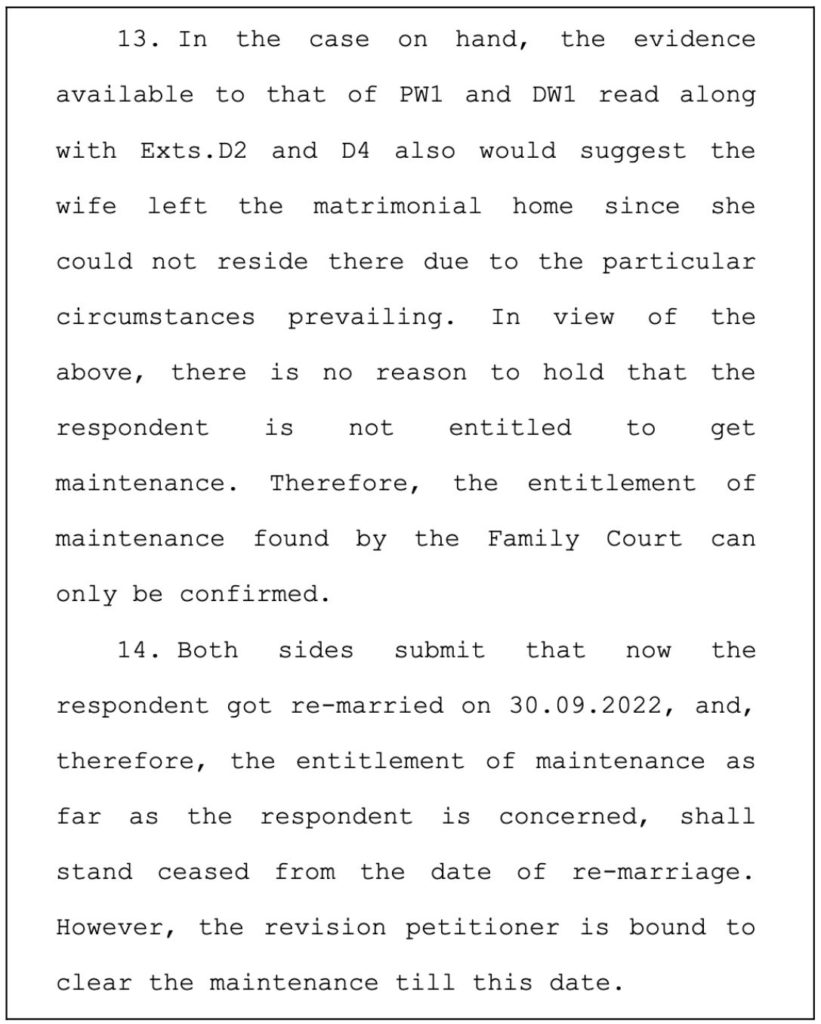
MP HC: Restrains authorities from demolishing property by giving less than a day’s notice.
Justice Satyendra Kumar Singh of Madhya Pradesh High Court’s Indore Bench restrained the authorities from demolishing the property of the litigant, who was given less than a day’s notice by the authorities.
Hearing the case, the court held that it would only be fair if the litigant was given reasonable time to file an objection before the appropriate authorities.
As per the case details, the petitioner (i.e., the litigant) was served a notice by the authorities regarding the demolition of his property allegedly constructed on government land. This notice was served on 28 December 2022, at 6:45 pm and the petitioner was required to file his reply by the next morning itself failing which the property would be demolished on 29 December 2022.
The aggrieved petitioner moved the court and submitted that he was being victimised for filing an election petition against the sitting MLA of the ruling party. Further, it was contended that the content of the notice and not providing enough time to file his reply support his argument that the notice was served owing to political reasons.
The state authorities argued that the property concerned was constructed upon government land and hence, the notice was issued. The opportunity to file a reply was provided and the petitioner is not entitled to any relief.
Examining the submissions made by both the parties and the documents, the court found it appropriate to restrain the State from taking any coercive action and grant the petitioner a reasonable opportunity to approach the appropriate authority.
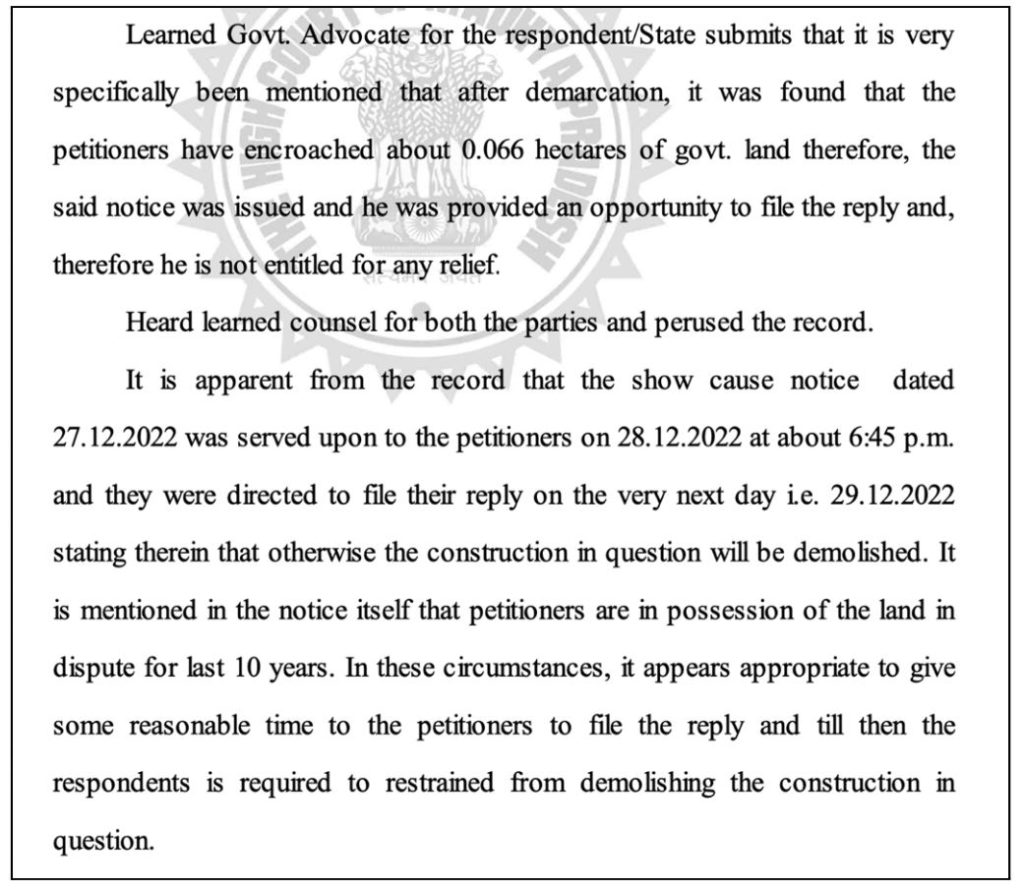
Madras HC: Thiruvarur hospital can recover compensation amount from doctors, officials in Medical Negligence case
In the case of The Dean, Government Medical College Hospital and another vs. Vijayalakshmi, the Madras High Court held that whenever a loss to the State Exchequer is caused due to the negligent acts of public servants, such a financial loss should be recovered from them.
As per the case details of the civil revision petition filed by the Dean of the Government Medical College Hospital, Thiruvarur and the District Collector, a woman instituted a suit against the hospital in 2015. She claimed compensation for medical negligence after an erroneous surgery left her totally blind.
Since she was able to prove the negligence, the Sub Court – Thiruvarur granted her a compensation of Rs. 5 lakhs and directed the hospital to pay the compensation amount within a period of 3 months.
An execution petition was initiated by her, and after a period of five years, the execution court passed an order in September 2022 attaching the movables to the office of the revision petitioners. This was challenged before the high court with the main contention that the order will cause inconvenience to the public institution.
The court stated that the compensation to the victim cannot be delayed, as it was granted in 2016. It further noted that, if the petitioners had a better case, they ought to have initiated appropriate steps.
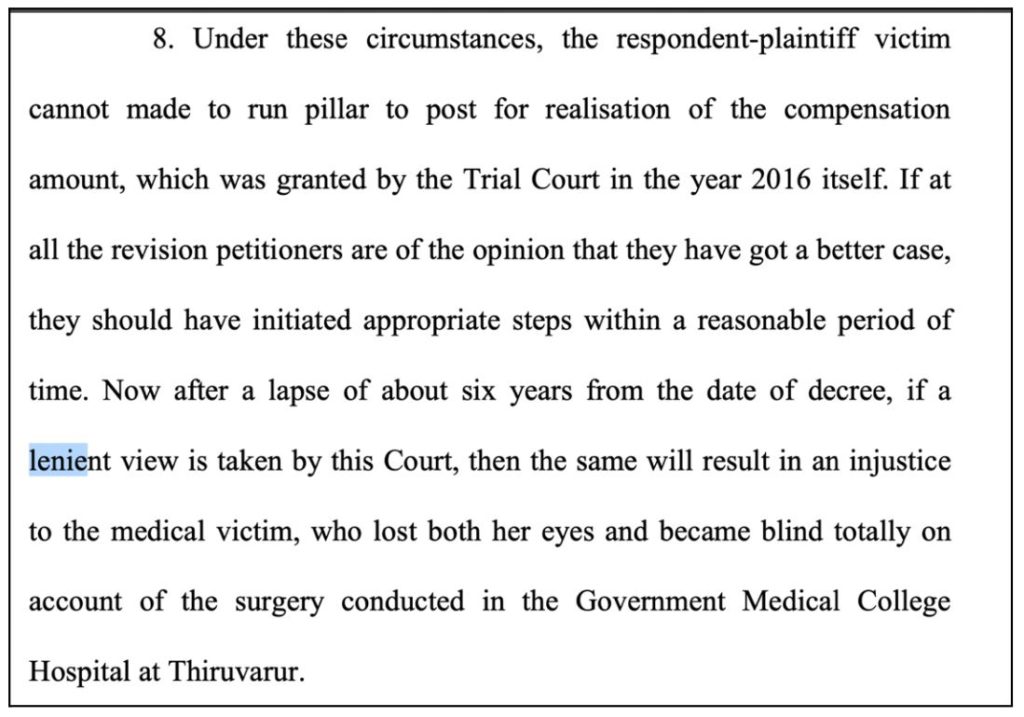
The court observed that when public officials commit an act of negligence, lapse or dereliction of duty and have caused financial loss to the State Exchequer, then such loss can be recovered from the public servants. The court did not find any reason to interfere with the earlier judgment and directed that the compensation amount be deposited with the execution court by 10 January 2023, failing which the court can proceed with the attachment of properties.
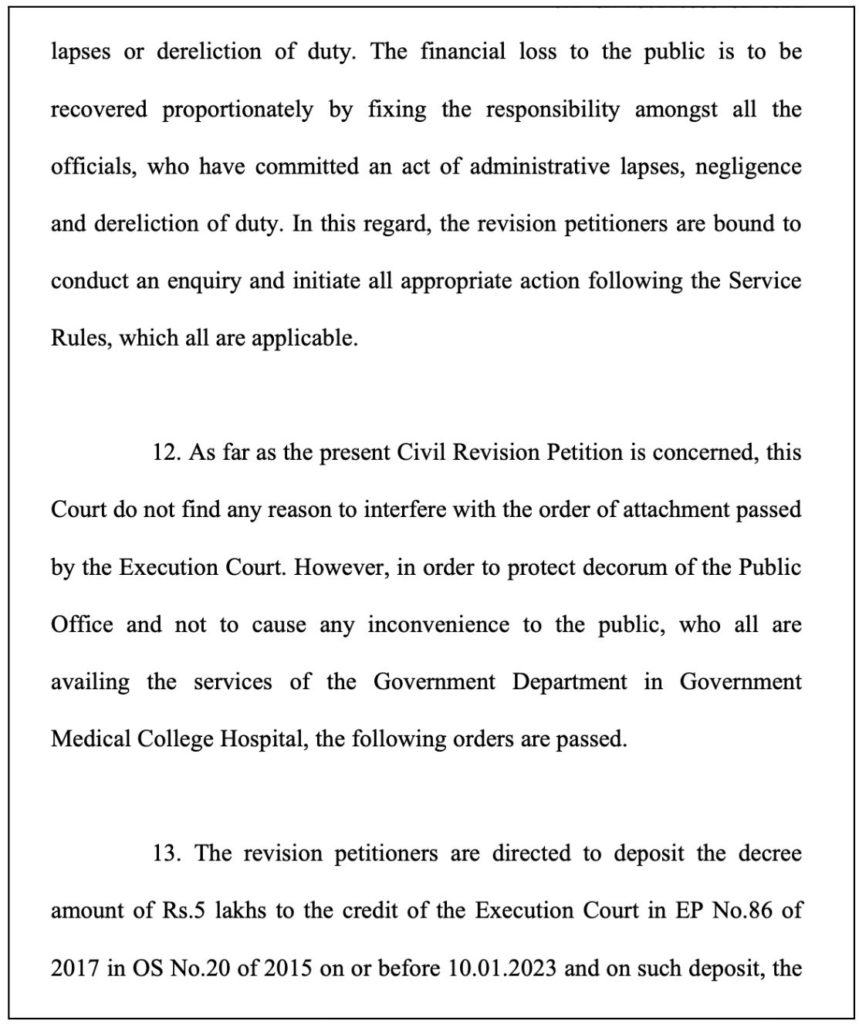
Bombay HC: Difficult to accept a widow with two children residing in a thickly populated locality could be forcibly raped.
The Bombay High Court quashed an FIR against a man accused of raping a woman, stating that the court finds it difficult to accept that a widow with two children could be raped many times in a thickly populated locality.
A Criminal Appeal was filed by a man seeking to quash the chargesheet and an FIR was filed against him for offences punishable under Sections 376, 406, 427, 323, 506 of the IPC.
As per the Woman’s case, one night, the applicant entered her house in the presence of her children on the pretext of drinking water. He brandished a knife threatening to kill her and proceeded to rape her. He also threatened the lives of her children. It was alleged that he repeatedly used to threaten her and had forcible physical relations with her.
In another incident, he demanded money, which she refused. He took her gold jewellery to mortgage them and get money. The woman, frustrated with this conduct of his, approached the police, who registered an FIR and filed a chargesheet.
The argument submitted by the applicant was that the woman resides in a thickly populated area and knows the applicant for a long time. It was also argued that the allegations were vague and rape at knifepoint on a fully grown lady in her own house is not possible. It was submitted that the sexual encounters between the two were consensual. It was also pointed out that neither the parents nor the immediate neighbours had any knowledge of the alleged incidents.
The authorities submitted that the investigation is over and there is ample material against the applicant, therefore, he should face trial. The counsel on behalf of the woman stated that there was no consensual act, and she did not resist saving her children.
From the details of the case, the court noted that the alleged instances were reported for the first time six months after they began. The applicant who is the neighbour regularly visited her and even helped her at times. The supplementary statement of the woman further shows that she even entrusted her ATM Card for operation, which could lead to the presumption of a long-standing association.
The court also took into cognisance the statement of her parents and the immediate neighbours, who did not have any knowledge of the incidents. Further, the allegation of forcefully taking jewellery is false as the jeweller in his statement has said that the woman has accompanied the applicant twice for mortgaging ornaments.
The court also expressed concern over the delay in lodging an FIR with the allegations of rape. Based on the available information, the court opined that the sexual encounters between them seemed to be consensual and that facing trial would render an injustice to the applicant.
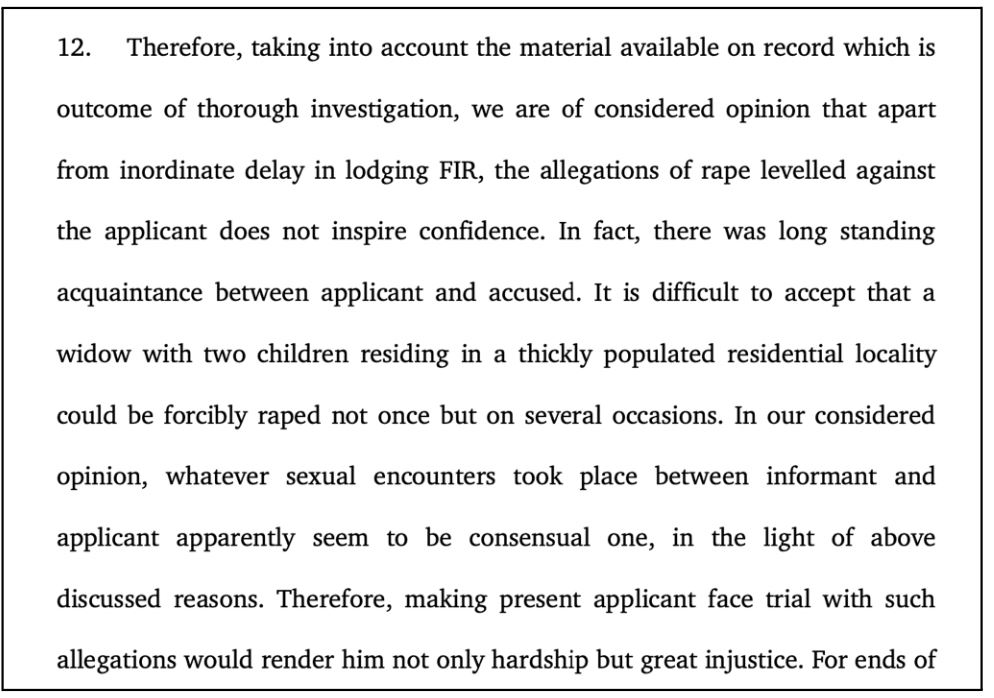
J&K&L High Court: One cannot challenge proceedings of enquiry committee after taking part in it without any demur.
In the case Dr.RK vs. UT of J&K, Jammu & Kashmir & Ladakh (J&K&L) High Court has reiterated that if a person participates in enquiry proceedings without any demur, he/she is not entitled to later challenge the constitution of the enquiry committee after finding out that the result has gone against them.
A plea was filed by a female doctor challenging the enquiry report of the Complaints Committee constituted under the Sexual Harassment of Women at Workplace (Prevention, Prohibition and Redressal) Act, 2013 wherein it was concluded that the entire case including the testimonies of the witness and the charges levelled against the respondent was not proven. In the petition, the petitioner has also challenged the constitution of the Complaints Committee.
The petitioner has alleged that the respondent in the capacity of the Director of Health Services Kashmir has conveyed certain ‘sexually coloured remarks” to her, and his behaviour was highly distasteful. There was continuous harassment in different ways, because of which she filed a case with the Lieutenant Governor.
The complaint was referred to the Complaints committee, which conducted the enquiry and concluded that the allegations against the respondent were not proven.
This report was challenged in the High court. Looking into this matter, the court observed that a person who participates in the enquiry proceedings or selection without any demur, cannot on a later date challenge the constitution of the enquiry committee.
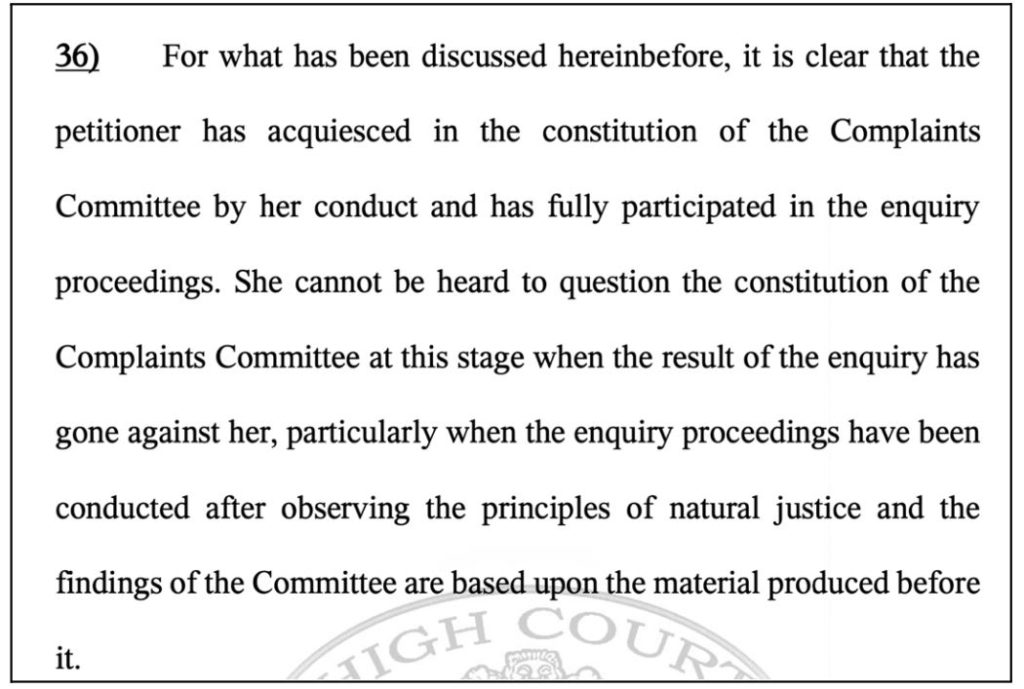
Supreme Court Constitution bench upholds Union Government’s decision of Demonetization in 2016.
The Supreme Court Bench upheld by a 4:1 majority the decision taken by the Union Government in 2016, to demonetise the currency notes of Rs. 500 and Rs.1000 denominations.
The majority of the 5-judge bench held that the decision by the Union government satisfies the test of proportionality. The majority was of the view that demonetisation had a reasonable nexus with the objectives, however, whether the objectives were achieved is not relevant.
It noted that the 52 days for currency exchange is reasonable, and the decision-making process cannot be faulted because the proposals originated from the Central government. It held that Section 26(2) RBI Act, which empowers Centre to demonetise any series of bank notes of any denomination, can be used to demonetise the whole series of currency.
Justice BV Nagarathna had a dissenting view and held that though demonetisation was well-intentioned, it has to be declared unlawful on legal grounds.


